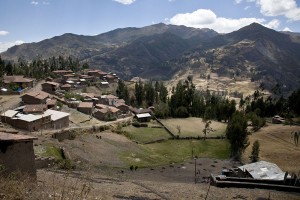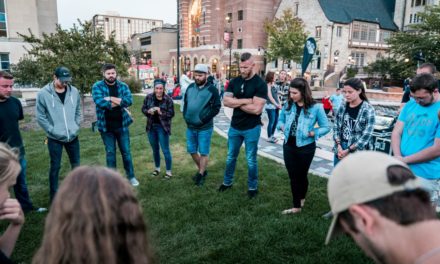
Cordova, a rural farming village of about 300 inhabitants, is situated at nearly 11,000 feet in the Peruvian Andes. Ashland Avenue Baptist Church in Lexington, Ky. sends volunteer teams there throughout the year. IMB photo.
by Elaine Gaston
CORDOVA, Peru (BP) — When Eric Turner was growing up, he couldn’t have dreamed God was preparing him to live two years in the Peruvian Andes.
Now that he’s been living there, Turner says Cordova, a farming village of about 300 in Peru, shares similarities with his hometown of Cynthiana, Ky., a farming community of about 6,000.
“Both towns are very agriculturally based,” said Turner, the tall and lanky 22-year-old member of Ashland Avenue Baptist Church in Lexington, Ky. Turner arrived in Cordova in May of 2012 to help his congregation back home impact the Peruvian village for Christ.
“A lot of people work hard out in the fields all day and come in to town in the evening: [the] same sort of stuff — plowing and sowing fields, herding livestock, raising your own food for your family.”
He said only the technology used in farming and level of poverty in Cordova contrast with his Kentucky home. “In Cynthiana, they have tractors and chain saws,” he said. “In Cordova, it’s oxen and axes.”
The Ayacucho Quechua live in this region. “Ayacucho” refers to the dialect spoken by the Quechua people in the area. There are about 1 million Ayacucho Quechua speakers in Peru. Most Cordovans are subsistence farmers who raise sheep and various crops such as lima beans and potatoes.
Cordova, like most small Andean villages, is off the beaten path and would fall under the radar of people’s notice. To get to the village from the capital of Lima is a day’s drive along rugged mountain roads. There’s no Internet service in the town of mostly mud-brick houses. It is just one of hundreds of similar small villages sprinkled throughout the mountains of south-central Peru.
But Ashland Avenue Baptist Church in Lexington, Ky., has chosen to invest itself in this village, sending missions teams several times a year and having at least one person like Turner on location there.
Jeremy Haskins, missions pastor of Ashland Avenue Baptist, explained how the church came to choose Cordova and this area of Peru. In the past, he said, the church had taken something of a “shotgun” approach to volunteer missions projects without a lot of focus. But a few years ago the church decided that, along with funding missionaries through the Cooperative Program, it wanted its additional missions efforts to be more focused.
“We support the International Mission Board and the Cooperative Program, but we didn’t want to just sit back,” Haskins said.
So the church chose a place so small and isolated that full-time missionaries who travel throughout the region would not strategically be able to base themselves there. Teams from the Kentucky church make trips to Cordova several times a year to bring medical and educational supplies or simply to build relationships by being a part of village life, even working beside Cordovans in the fields.
From a spiritual point of view, Haskins described the village as “pretty dark” with ancient pagan beliefs and Roman Catholicism mixed together in a potent brew, the result being that, in daily life, “there is not a lot of hope.”
Turner is acutely aware of the spiritual battles of the work he’s engaged in.
“C. S. Lewis accurately describes the situation when he says, ‘There is no neutral ground in the universe; every square inch, every split second, is claimed by God and counter-claimed by Satan,'” Turner said.
Ioana Cosoreanu understands. Also from Ashland Avenue Baptist, she spent several months in Cordova before Turner’s tenure and returned with a volunteer missions team in 2012.
“Cordova is definitely a battlefield, spiritually speaking…. You can feel the spiritual darkness just pressing down,” Cosoreanu said. She recalled seeing the emptiness of their faith as the statue of the Virgin of Carmen was being paraded around during the annual festival, and people were weeping before her, worshipping her and praying to her for wealth, a successful business or good health.
With the strategy of focusing on this one village, the church hopes to start something that will reach into the hearts of many villages. Ashland Avenue Baptist doesn’t want the story to end simply with a church in Cordova. At the core of the church’s missions vision is that the work based in Cordova will grow into a church-planting movement that will spread through surrounding villages in the mountains.
Though Turner isn’t the first from Ashland Avenue Baptist to live in Cordova, his two-year commitment is the longest thus far. Within his first month, he was regularly discipling four young men.
“Equipping the believers of Cordova to share the Gospel is a primary goal for my time here,” Turner said. He performed his first baptisms with two new believers, an experience that he found humbling and exciting at the same time. He pointed out that the receptiveness he encountered just after his arrival was the result of the work of others who have come to this remote village and shared the Gospel. “They have laid a foundation that I get the amazing opportunity to build upon,” he said.
“Spiritually I know they are praying for me,” Turner said. “Not only do they tell me every chance they get, but I feel their prayers. There’s just too much happening that I have nothing to do with, that can’t be explained by anything other than God’s response to the prayers of my church family.”
When he manages to get to a place with Internet access, Turner records some of his experiences in a blog (TheMissionToCordova.wordpress.com).
There, he wrote, “I wish I could share all of the wonderful stories of God’s grace and what life is like here. I’ve herded sheep and cows, wielded a machete for chopping wood until my hands were raw with blisters, ridden a donkey, played and watched more soccer than [at] any point in my life, eaten strange things, and made so many new friends…. Thanks be to God that He is so powerful He can use my broken Spanish, feeble understanding of the culture, and weakness to advance His kingdom. I have learned … that truly any fruit here can only be explained by God’s power.”
Elaine Gaston writes for WMU and IMB. Ashland Avenue Baptist Church’s mission work in Peru was featured in the 2013 International Mission Study on Peru, published by Woman’s Missionary Union. To learn more about the study, go to wmu.com/peru







